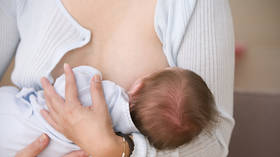Trans ‘milk’ as good as the real thing – NHS

The drug-induced nipple secretions of trans women are as good as mothers’ breast milk for babies, the University of Sussex Hospitals NHS Trust claimed in a letter to campaigners made public in a report by British think tank the Policy Exchange on Sunday.
The healthcare trust’s medical director, Rachel James, argued that the off-label prescription drug cocktail men transitioning to female take in order to produce milk was “similar to the natural hormones which encourage lactation to develop when the baby is newly born.”
“The evidence which is available demonstrates that the milk is comparable to that produced following the birth of a baby,” James wrote in the letter, sent to Children of Transitioners last August.
Biological men who wish to lactate must first take hormones to grow milk glands and then take high doses of either domperidone or metoclopramide to stimulate milk production. Neither drug is approved for this use, though they are occasionally prescribed off-label to biological women who have trouble lactating.
However, domperidone’s own manufacturer, Janssen, warns patients the drug “may cause unwanted side effects affecting the heart in a breastfed baby” and “should be used during breastfeeding only if your physician considers this clearly necessary.”
USHT doubled down on its claims that chest “milk” was just as good as breast milk on Sunday. “We stand by the facts of the letter and the cited evidence supporting them,” it said in a statement.
That evidence reportedly included a handful of decades-old articles comparing milk produced by induced lactation with postpartum mother’s milk - apparently not distinguishing between milk produced by biological women and that produced by biological men - and the World Health Organization’s recommendation of breastmilk (which the trust called “human milk”) over infant formula.
The trust also cited a 2022 study that found there were “no observable infant side effects” in the babies of lactating trans women. However, critics pointed out that the study lasted just five months and included no long-term follow-up. Most writings on the subject “have not looked at what’s in the milk itself,” one medical expert told the Daily Mail.
The group admitted its policy was based on advice from “external organizations,” though it did not name them. USHT was reportedly the first UK health trust to adopt the term “birthing people” as part of its inclusivity efforts.
Denouncing the NHS trust’s claims as “unbalanced and naive,” Policy Exchange Head of Equality and Identity Lottie Moore slammed the organization for “compromising women’s rights and child safeguarding” by encouraging unsafe practices.
“A child’s welfare must always take precedence over identity politics and contested belief systems that are not evidence-based,” she told the Mail.













